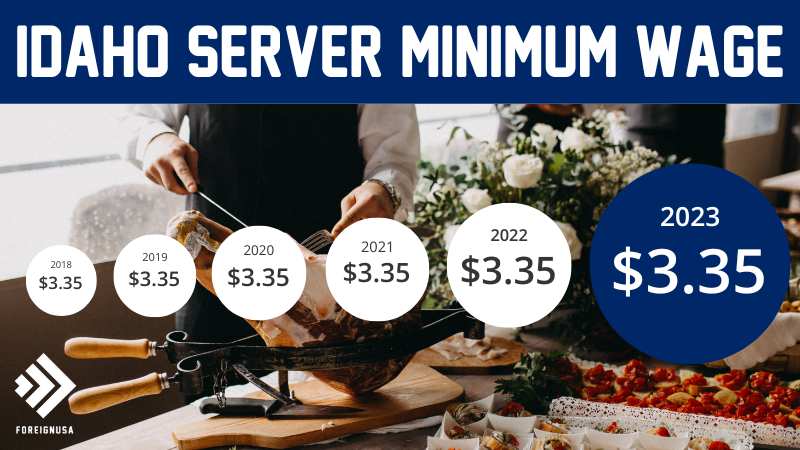If you are a server in Idaho or are considering becoming one, then you should know what the minimum wage is for servers in Idaho to ensure you are being paid the correct amount, or whether this is a job you would like to do.
The laws surrounding the Idaho minimum wage for servers are designed to provide a safety net for those that may not earn enough in tips to meet the minimum wage threshold in the state. The server minimum wage in Idaho is $3.35 per hour in 2023.
Servers are those who provide and serve their customers with food and beverages in a restaurant or similar type of business where food and drinks are brought to the table, and as part of this service, a server will typically receive tips (gratuities) for doing so.
Idaho servers certainly rely less on their low hourly wage and more on the generosity of the guests they serve each day for their paycheck each week.
Idaho Server Minimum Wage 2023
So, what is the minimum wage for a waiter in Idaho? The minimum cash wage for a waiter or server in Idaho is the same as the tipped minimum wage in Idaho, which is $3.35 per hour.
This is the minimum per hour that an Idaho server must be paid and that an Idaho employer must pay its servers. As you can see from the following graphic, the minimum wage for servers in Idaho has not increased over the past several years.

Server Minimum Wage in Idaho (Minimum Cash Wage and Tip Credits)
$3.35 per hour is not very much for a tipped server to be paid, but if tips are not sufficient enough Idaho servers are required to be supplemented by their employers via “tipped credit”, which is, in Idaho’s case, $3.90 per hour, making the server minimum wage in Idaho a total of $7.25 per hour.
The regular minimum wage in Idaho for all types of employees follows the federal minimum wage guidelines, and it has been this way since 2008.
Based on the tipped minimum wage laws that apply to all states, Idaho employers are required to pay their employees an hourly minimum cash wage with the addition of tip credits.
What tipped credits allow employers to do is pay tipped employees less than the minimum wage so long as they can make up the difference via tips per hour during each pay period.
Tip credit not only allows server employees to be paid less than the minimum hourly wage, but it is also the same concept with bartenders, hotel workers, airport attendants, casino workers, and pretty much any job role where tips are the primary income for the employee.
In Idaho, servers must be paid a base minimum cash wage of $3.35 per hour. The expectation is that Idaho servers will make at least an additional $3.90 per hour in tips on average across their pay period, and if they do, then the employer is only obligated to pay an Idaho server $3.35 per hour.
Let’s assume that a server does not make at least $3.90 per hour in tips as an average over the course of a working week, then the employer must step in and pay the Idaho server a tip credit of up to $3.90 per hour, so the server makes a minimum of $7.25 per hour ($3.35 plus $3.90) for the duration of the pay period that they worked.
Fair Labor Standards Act (FLSA) and Tipped Employees
The Federal Fair Labor Standards Act, also known as the FLSA, is a federal law from the U.S. Department of Labor.
This law establishes a national minimum wage, defines classifications for employees, and covers other essential standards and requirements for employers.
Federal law requires that employers make tipped employees aware of the cash wage paid (currently, the national direct hourly salary is $2.13 per hour), let them know about the tip credit, and explain any tip pooling systems at the workplace.
Idaho Server Minimum Wage History
The table below showcases the current rate and history of the Idaho server minimum wage over the past 15+ years since 2008. You can see when there were increases in the server minimum wage, which includes not only the tipped minimum wage rates but the tipped credit rates too.
| State | Tipped Server Wage | Tip Credit | Total |
|---|---|---|---|
| Idaho server minimum wage 2023 | $3.35 | $3.90 | $7.25 |
| Idaho server minimum wage 2022 | $3.35 | $3.90 | $7.25 |
| Idaho server minimum wage 2021 | $3.35 | $3.90 | $7.25 |
| Idaho server minimum wage 2020 | $3.35 | $3.90 | $7.25 |
| Idaho server minimum wage 2019 | $3.35 | $3.90 | $7.25 |
| Idaho server minimum wage 2018 | $3.35 | $3.90 | $7.25 |
| Idaho server minimum wage 2017 | $3.35 | $3.90 | $7.25 |
| Idaho server minimum wage 2016 | $3.35 | $3.90 | $7.25 |
| Idaho server minimum wage 2015 | $3.35 | $3.90 | $7.25 |
| Idaho server minimum wage 2014 | $3.35 | $3.90 | $7.25 |
| Idaho server minimum wage 2013 | $3.35 | $3.90 | $7.25 |
| Idaho server minimum wage 2012 | $3.35 | $3.90 | $7.25 |
| Idaho server minimum wage 2011 | $3.35 | $3.90 | $7.25 |
| Idaho server minimum wage 2010 | $3.35 | $3.90 | $7.25 |
| Idaho server minimum wage 2009 | $3.35 | $3.90 | $7.25 |
| Idaho server minimum wage 2008 | $3.35 | $3.20 | $6.55 |
Average Server Salary in Idaho (2023)
If you are a server or are looking to work as a server in a restaurant or similar service-related business in Idaho, knowing the hourly wage for servers is important, but knowing what you can expect to earn is perhaps even more important.
Most Idaho servers are not going to take a position at a restaurant with the view that they can only earn $7.25 per hour, because based on working 35-40 hours a week, they could only earn $254-$290 per week.
What Do Servers Get Paid in Idaho
The average server hourly wage in Idaho (according to the jobs website Indeed.com) is $13.77 per hour. So, if you were to work an 8-hour shift or a total of 8 hours in a day across a couple of shifts, you could earn (on average) about $110.00 (8 hrs x $13.77).
If you worked five days per week and rounded your daily pay to $110, then you could earn about $550 per week.
If you took just two weeks off a year and worked for 50 weeks you could earn $27,500. If you decided to take 3 weeks off per year, or a total amount of time that was the equivalent of about 3 weeks off, then you could earn 49 x $550 = $26,950 for the year. This, of course, is before Idaho’s income tax has been deducted.
The above calculations are just averages to give you an idea of what you can earn as an Idaho server.
The most important aspects of how much you can earn will depend on how good you are at your job, what type of food/beverage establishment you work at, how busy the restaurant/cafe or bar is, and how many other servers are working with you.
Also, many people that work at restaurants or similar establishments are willing to work more than 40 hours per week which may make them qualify for overtime pay.
If the average food item on the menu is $8-$15 and the restaurant mainly serves wings, burgers, subs, nachos, fries, and similar snack-style food, then the average check for each guest or table may not be that high, and therefore, the percentage tip against the total check could result in you earning a lower amount of tips per table you serve and you’ll have to serve many tables during your shift.
On the other hand, if you work at a finer dining restaurant or one that is really busy and serves steak, seafood, and other higher-priced menu and beverage items, then you stand to earn more money as the total check for each table you serve will be that much higher and the percentage tip you receive on a higher check will be that much more.
Final Thoughts
As an Idaho employer, it is your responsibility to pay your servers a minimum hourly rate + tip credit that equals or surpasses the Idaho minimum wage in the event that your servers do not earn enough to meet the $7.25 per hour threshold.
Failing to do so will be breaking federal and state laws. Equally, it is important that as a server working in Idaho, you know your rights and how much you should be paid with your hourly wage and tip credits.
If you have specific questions about the laws surrounding the minimum wage for servers in Idaho (tipped employees) from both an employer and employee perspective, you can contact the Idaho Department of Labor. Additionally, if you are an employee who isn’t being paid what you legally should be, you can file a complaint with them too.


